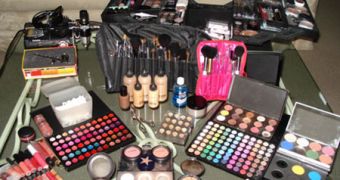A team of specialists working with the Washington University, Missouri has recently made it public news that, according to their latest studies, using too much make-up and hairspray can toy with a woman's reproductive system, causing her to enter menopause earlier that previous generations did.
The chemical compounds now held responsible for an early onset of menopause are known to science as phthalates, and previous studies have already linked them to an increased risk of developing health conditions such as cancer, diabetes and obesity.
Although high exposure to these chemicals typically leads to a woman's entering menopause two and a half years earlier than normal, it seems that in certain cases it is very well possible that the woman's ovaries will quit releasing eggs 15 years sooner than they are supposed to.
Some might argue that, as long as a woman is not planning to have children, an early onset of menopause might not be such a bad thing.
Still, Dr. Natalia Grinder from said university wishes to emphasize the fact that an early menopause ups the rates of strokes, heart diseases, bone problems and brain hemorrhages, Daily Mail informs us.
“Early menopause has a lot of impact on your health. We absolutely think these chemicals have the potential to affect ovarian function and human reproduction,” Dr. Natalia Grinder commented with respect to their findings.
Furthermore, “There’s a lot that we don’t know at this point, our research is still preliminary, but it’s enough to suggest it is having a detrimental impact in the long term.”
Because phthalates are found not just in make-up and hairspray, but also in food packaging, these specialists argue that one sure way to avoid exposure to high doses of these chemical compounds is to opt for fresh food and try and cut down on the amounts of cosmetics used on a daily basis.
This news concerning the early onset of menopause comes shortly after other researchers have pointed the finger at the issue of boys hitting puberty two years earlier than in the previous decades.

 14 DAY TRIAL //
14 DAY TRIAL //